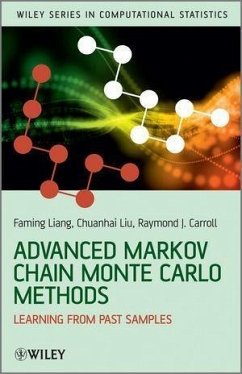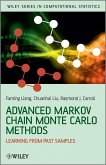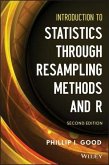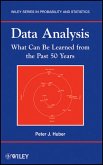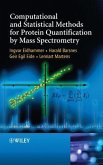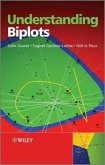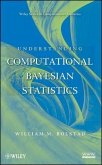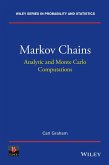Advanced Markov Chain Monte Carlo Methods (eBook, ePUB)
Learning from Past Samples


Alle Infos zum eBook verschenken

Advanced Markov Chain Monte Carlo Methods (eBook, ePUB)
Learning from Past Samples
- Format: ePub
- Merkliste
- Auf die Merkliste
- Bewerten Bewerten
- Teilen
- Produkt teilen
- Produkterinnerung
- Produkterinnerung

Hier können Sie sich einloggen

Bitte loggen Sie sich zunächst in Ihr Kundenkonto ein oder registrieren Sie sich bei bücher.de, um das eBook-Abo tolino select nutzen zu können.
Markov Chain Monte Carlo (MCMC) methods are now an indispensable tool in scientific computing. This book discusses recent developments of MCMC methods with an emphasis on those making use of past sample information during simulations. The application examples are drawn from diverse fields such as bioinformatics, machine learning, social science, combinatorial optimization, and computational physics. Key Features: * Expanded coverage of the stochastic approximation Monte Carlo and dynamic weighting algorithms that are essentially immune to local trap problems. * A detailed discussion of the…mehr
- Geräte: eReader
- mit Kopierschutz
- eBook Hilfe
- Größe: 20.13MB
![Advanced Markov Chain Monte Carlo Methods (eBook, PDF) Advanced Markov Chain Monte Carlo Methods (eBook, PDF)]() Faming LiangAdvanced Markov Chain Monte Carlo Methods (eBook, PDF)96,99 €
Faming LiangAdvanced Markov Chain Monte Carlo Methods (eBook, PDF)96,99 €![Introduction to Statistics Through Resampling Methods and R (eBook, ePUB) Introduction to Statistics Through Resampling Methods and R (eBook, ePUB)]() Phillip I. GoodIntroduction to Statistics Through Resampling Methods and R (eBook, ePUB)59,99 €
Phillip I. GoodIntroduction to Statistics Through Resampling Methods and R (eBook, ePUB)59,99 €![Data Analysis (eBook, ePUB) Data Analysis (eBook, ePUB)]() Peter J. HuberData Analysis (eBook, ePUB)116,99 €
Peter J. HuberData Analysis (eBook, ePUB)116,99 €![Computational and Statistical Methods for Protein Quantification by Mass Spectrometry (eBook, ePUB) Computational and Statistical Methods for Protein Quantification by Mass Spectrometry (eBook, ePUB)]() Ingvar EidhammerComputational and Statistical Methods for Protein Quantification by Mass Spectrometry (eBook, ePUB)80,99 €
Ingvar EidhammerComputational and Statistical Methods for Protein Quantification by Mass Spectrometry (eBook, ePUB)80,99 €![Understanding Biplots (eBook, ePUB) Understanding Biplots (eBook, ePUB)]() John GowerUnderstanding Biplots (eBook, ePUB)92,99 €
John GowerUnderstanding Biplots (eBook, ePUB)92,99 €![Understanding Computational Bayesian Statistics (eBook, ePUB) Understanding Computational Bayesian Statistics (eBook, ePUB)]() William M. BolstadUnderstanding Computational Bayesian Statistics (eBook, ePUB)129,99 €
William M. BolstadUnderstanding Computational Bayesian Statistics (eBook, ePUB)129,99 €![Markov Chains (eBook, ePUB) Markov Chains (eBook, ePUB)]() Carl GrahamMarkov Chains (eBook, ePUB)86,99 €
Carl GrahamMarkov Chains (eBook, ePUB)86,99 €-
-
-
Dieser Download kann aus rechtlichen Gründen nur mit Rechnungsadresse in A, B, BG, CY, CZ, D, DK, EW, E, FIN, F, GR, HR, H, IRL, I, LT, L, LR, M, NL, PL, P, R, S, SLO, SK ausgeliefert werden.
- Produktdetails
- Verlag: John Wiley & Sons
- Seitenzahl: 374
- Erscheinungstermin: 5. Juli 2011
- Englisch
- ISBN-13: 9781119956808
- Artikelnr.: 37358111
- Verlag: John Wiley & Sons
- Seitenzahl: 374
- Erscheinungstermin: 5. Juli 2011
- Englisch
- ISBN-13: 9781119956808
- Artikelnr.: 37358111
- Herstellerkennzeichnung Die Herstellerinformationen sind derzeit nicht verfügbar.
Acknowledgments xvii
Publisher's Acknowledgments xix
1 Bayesian Inference and Markov Chain Monte Carlo 1
1.1 Bayes 1
1.1.1 Specification of Bayesian Models 2
1.1.2 The Jeffreys Priors and Beyond 2
1.2 Bayes Output 4
1.2.1 Credible Intervals and Regions 4
1.2.2 Hypothesis Testing: Bayes Factors 5
1.3 Monte Carlo Integration 8
1.3.1 The Problem 8
1.3.2 Monte Carlo Approximation 9
1.3.3 Monte Carlo via Importance Sampling 9
1.4 Random Variable Generation 10
1.4.1 Direct or Transformation Methods 1
1.4.2 Acceptance-Rejection Methods 11
1.4.3 The Ratio-of-Uniforms Method and Beyond 14
1.4.4 Adaptive Rejection Sampling 18
1.4.5 Perfect Sampling 18
1.5 Markov Chain Monte Carlo 18
1.5.1 Markov Chains 18
1.5.2 Convergence Results 20
1.5.3 Convergence Diagnostics 23
Exercises 24
2 The Gibbs Sampler 27
2.1 The Gibbs Sampler 27
2.2 Data Augmentation 30
2.3 Implementation Strategies and Acceleration Methods 33
2.3.1 Blocking and Collapsing 33
2.3.2 Hierarchical Centering and Reparameterization 34
2.3.3 Parameter Expansion for Data Augmentation 35
2.3.4 Alternating Subspace-Spanning Resampling 43
2.4 Applications 45
2.4.1 The Student-t Model 45
2.4.2 Robit Regression or Binary Regression with the Student-t Link 47
2.4.3 Linear Regression with Interval-Censored Responses 50
Exercises 54
Appendix 2A: The EM and PX-EM Algorithms 56
3 The Metropolis-Hastings Algorithm 59
3.1 The Metropolis-Hastings Algorithm 59
3.1.1 Independence Sampler 62
3.1.2 Random Walk Chains 63
3.1.3 Problems with Metropolis-Hastings Simulations 63
3.2 Variants of the Metropolis-Hastings Algorithm 65
3.2.1 The Hit-and-Run Algorithm. 65
3.2.2 The Langevin Algorithm 65
3.2.3 The Multiple-Try MH Algorithm 66
3.3 Reversible Jump MCMC Algorithm for Bayesian Model Selection Problems 67
3.3.1 Reversible Jump MCMC Algorithm 67
3.3.2 Change-Point Identification 70
3.4 Metropolis-Within-Gibbs Sampler for ChIP-chip Data Analysis 75
3.4.1 Metropolis-Within-Gibbs Sampler 75
3.4.2 Bayesian Analysis for ChIP-chip Data 76
Exercises 83
4 Auxiliary Variable MCMC Methods 85
4.1 Simulated Annealing 86
4.2 Simulated Tempering 88
4.3 The Slice Sampler 90
4.4 The Swendsen-Wang Algorithm 91
4.5 The Wolff Algorithm 93
4.6 The Mo/ller Algorithm 95
4.7 The Exchange Algorithm 97
4.8 The Double MH Sampler 98
4.8.1 Spatial Autologistic Models 99
4.9 Monte Carlo MH Sampler 103
4.9.1 Monte Carlo MH Algorithm 103
4.9.2 Convergence 107
4.9.3 Spatial Autologistic Models (Revisited) 110
4.9.4 Marginal Inference 111
4.10 Applications 113
4.10.1 Autonormal Models 114
4.10.2 Social Networks 116
Exercises 121
5 Population-Based MCMC Methods 123
5.1 Adaptive Direction Sampling 124
5.2 Conjugate Gradient Monte Carlo 125
5.3 Sample Metropolis-Hastings Algorithm 126
5.4 Parallel Tempering 127
5.5 Evolutionary Monte Carlo 128
5.5.1 Evolutionary Monte Carlo in Binary-Coded Space 129
5.5.2 Evolutionary Monte Carlo in Continuous Space 132
5.5.3 Implementation Issues 133
5.5.4 Two Illustrative Examples 134
5.5.5 Discussion 139
5.6 Sequential Parallel Tempering for Simulation of High Dimensional
Systems 140
5.6.1 Build-up Ladder Construction 141
5.6.2 Sequential Parallel Tempering 142
5.6.3 An Illustrative Example: the Witch's Hat Distribution 142
5.6.4 Discussion 145
5.7 Equi-Energy Sampler 146
5.8 Applications 148
5.8.1 Bayesian Curve Fitting 148
5.8.2 Protein Folding Simulations: 2D HP Model 153
5.8.3 Bayesian Neural Networks for Nonlinear Time Series Forecasting 156
Exercises 162
Appendix 5A: Protein Sequences for 2D HP Models 163
6 Dynamic Weighting 165
6.1 Dynamic Weighting 165
6.1.1 The IWIW Principle 165
6.1.2 Tempering Dynamic Weighting Algorithm 167
6.1.3 Dynamic Weighting in Optimization 171
6.2 Dynamically Weighted Importance Sampling 173
6.2.1 The Basic Idea 173
6.2.2 A Theory of DWIS 174
6.2.3 Some IWIWp Transition Rules 176
6.2.4 Two DWIS Schemes 179
6.2.5 Weight Behavior Analysis 180
6.2.6 A Numerical Example 183
6.3 Monte Carlo Dynamically Weighted Importance Sampling 185
6.3.1 Sampling from Distributions with Intractable Normalizing Constants
185
6.3.2 Monte Carlo Dynamically Weighted Importance Sampling 186
6.3.3 Bayesian Analysis for Spatial Autologistic Models 191
6.4 Sequentially Dynamically Weighted Importance Sampling 195
Exercises 197
7 Stochastic Approximation Monte Carlo 199
7.1 Multicanonical Monte Carlo 200
7.2 1/k-Ensemble Sampling 202
7.3 The Wang-Landau Algorithm 204
7.4 Stochastic Approximation Monte Carlo 207
7.5 Applications of Stochastic Approximation Monte Carlo 218
7.5.1 Efficient p-Value Evaluation for Resampling-Based Tests 218
7.5.2 Bayesian Phylogeny Inference 222
7.5.3 Bayesian Network Learning 227
7.6 Variants of Stochastic Approximation Monte Carlo 233
7.6.1 Smoothing SAMC for Model Selection Problems 233
7.6.2 Continuous SAMC for Marginal Density Estimation 239
7.6.3 Annealing SAMC for Global Optimization 244
7.7 Theory of Stochastic Approximation Monte Carlo 253
7.7.1 Convergence 253
7.7.2 Convergence Rate 267
7.7.3 Ergodicity and its IWIW Property 271
7.8 Trajectory Averaging: Toward the Optimal Convergence Rate 275
7.8.1 Trajectory Averaging for a SAMCMC Algorithm 277
7.8.2 Trajectory Averaging for SAMC 279
7.8.3 Proof of Theorems 7.8.2 and 7.8.3 281
Exercises 296
Appendix 7A: Test Functions for Global Optimization 298
8 Markov Chain Monte Carlo with Adaptive Proposals 305
8.1 Stochastic Approximation-Based Adaptive Algorithms 306
8.1.1 Ergodicity and Weak Law of Large Numbers 307
8.1.2 Adaptive Metropolis Algorithms 309
8.2 Adaptive Independent Metropolis-Hastings Algorithms 312
8.3 Regeneration-Based Adaptive Algorithms 315
8.3.1 Identification of Regeneration Times 315
8.3.2 Proposal Adaptation at Regeneration Times 317
8.4 Population-Based Adaptive Algorithms 317
8.4.1 ADS, EMC, NKC and More 317
8.4.2 Adaptive EMC 318
8.4.3 Application to Sensor Placement Problems 323
Exercises 324
References 327
Index 353
Acknowledgments xvii
Publisher's Acknowledgments xix
1 Bayesian Inference and Markov Chain Monte Carlo 1
1.1 Bayes 1
1.1.1 Specification of Bayesian Models 2
1.1.2 The Jeffreys Priors and Beyond 2
1.2 Bayes Output 4
1.2.1 Credible Intervals and Regions 4
1.2.2 Hypothesis Testing: Bayes Factors 5
1.3 Monte Carlo Integration 8
1.3.1 The Problem 8
1.3.2 Monte Carlo Approximation 9
1.3.3 Monte Carlo via Importance Sampling 9
1.4 Random Variable Generation 10
1.4.1 Direct or Transformation Methods 1
1.4.2 Acceptance-Rejection Methods 11
1.4.3 The Ratio-of-Uniforms Method and Beyond 14
1.4.4 Adaptive Rejection Sampling 18
1.4.5 Perfect Sampling 18
1.5 Markov Chain Monte Carlo 18
1.5.1 Markov Chains 18
1.5.2 Convergence Results 20
1.5.3 Convergence Diagnostics 23
Exercises 24
2 The Gibbs Sampler 27
2.1 The Gibbs Sampler 27
2.2 Data Augmentation 30
2.3 Implementation Strategies and Acceleration Methods 33
2.3.1 Blocking and Collapsing 33
2.3.2 Hierarchical Centering and Reparameterization 34
2.3.3 Parameter Expansion for Data Augmentation 35
2.3.4 Alternating Subspace-Spanning Resampling 43
2.4 Applications 45
2.4.1 The Student-t Model 45
2.4.2 Robit Regression or Binary Regression with the Student-t Link 47
2.4.3 Linear Regression with Interval-Censored Responses 50
Exercises 54
Appendix 2A: The EM and PX-EM Algorithms 56
3 The Metropolis-Hastings Algorithm 59
3.1 The Metropolis-Hastings Algorithm 59
3.1.1 Independence Sampler 62
3.1.2 Random Walk Chains 63
3.1.3 Problems with Metropolis-Hastings Simulations 63
3.2 Variants of the Metropolis-Hastings Algorithm 65
3.2.1 The Hit-and-Run Algorithm. 65
3.2.2 The Langevin Algorithm 65
3.2.3 The Multiple-Try MH Algorithm 66
3.3 Reversible Jump MCMC Algorithm for Bayesian Model Selection Problems 67
3.3.1 Reversible Jump MCMC Algorithm 67
3.3.2 Change-Point Identification 70
3.4 Metropolis-Within-Gibbs Sampler for ChIP-chip Data Analysis 75
3.4.1 Metropolis-Within-Gibbs Sampler 75
3.4.2 Bayesian Analysis for ChIP-chip Data 76
Exercises 83
4 Auxiliary Variable MCMC Methods 85
4.1 Simulated Annealing 86
4.2 Simulated Tempering 88
4.3 The Slice Sampler 90
4.4 The Swendsen-Wang Algorithm 91
4.5 The Wolff Algorithm 93
4.6 The Mo/ller Algorithm 95
4.7 The Exchange Algorithm 97
4.8 The Double MH Sampler 98
4.8.1 Spatial Autologistic Models 99
4.9 Monte Carlo MH Sampler 103
4.9.1 Monte Carlo MH Algorithm 103
4.9.2 Convergence 107
4.9.3 Spatial Autologistic Models (Revisited) 110
4.9.4 Marginal Inference 111
4.10 Applications 113
4.10.1 Autonormal Models 114
4.10.2 Social Networks 116
Exercises 121
5 Population-Based MCMC Methods 123
5.1 Adaptive Direction Sampling 124
5.2 Conjugate Gradient Monte Carlo 125
5.3 Sample Metropolis-Hastings Algorithm 126
5.4 Parallel Tempering 127
5.5 Evolutionary Monte Carlo 128
5.5.1 Evolutionary Monte Carlo in Binary-Coded Space 129
5.5.2 Evolutionary Monte Carlo in Continuous Space 132
5.5.3 Implementation Issues 133
5.5.4 Two Illustrative Examples 134
5.5.5 Discussion 139
5.6 Sequential Parallel Tempering for Simulation of High Dimensional
Systems 140
5.6.1 Build-up Ladder Construction 141
5.6.2 Sequential Parallel Tempering 142
5.6.3 An Illustrative Example: the Witch's Hat Distribution 142
5.6.4 Discussion 145
5.7 Equi-Energy Sampler 146
5.8 Applications 148
5.8.1 Bayesian Curve Fitting 148
5.8.2 Protein Folding Simulations: 2D HP Model 153
5.8.3 Bayesian Neural Networks for Nonlinear Time Series Forecasting 156
Exercises 162
Appendix 5A: Protein Sequences for 2D HP Models 163
6 Dynamic Weighting 165
6.1 Dynamic Weighting 165
6.1.1 The IWIW Principle 165
6.1.2 Tempering Dynamic Weighting Algorithm 167
6.1.3 Dynamic Weighting in Optimization 171
6.2 Dynamically Weighted Importance Sampling 173
6.2.1 The Basic Idea 173
6.2.2 A Theory of DWIS 174
6.2.3 Some IWIWp Transition Rules 176
6.2.4 Two DWIS Schemes 179
6.2.5 Weight Behavior Analysis 180
6.2.6 A Numerical Example 183
6.3 Monte Carlo Dynamically Weighted Importance Sampling 185
6.3.1 Sampling from Distributions with Intractable Normalizing Constants
185
6.3.2 Monte Carlo Dynamically Weighted Importance Sampling 186
6.3.3 Bayesian Analysis for Spatial Autologistic Models 191
6.4 Sequentially Dynamically Weighted Importance Sampling 195
Exercises 197
7 Stochastic Approximation Monte Carlo 199
7.1 Multicanonical Monte Carlo 200
7.2 1/k-Ensemble Sampling 202
7.3 The Wang-Landau Algorithm 204
7.4 Stochastic Approximation Monte Carlo 207
7.5 Applications of Stochastic Approximation Monte Carlo 218
7.5.1 Efficient p-Value Evaluation for Resampling-Based Tests 218
7.5.2 Bayesian Phylogeny Inference 222
7.5.3 Bayesian Network Learning 227
7.6 Variants of Stochastic Approximation Monte Carlo 233
7.6.1 Smoothing SAMC for Model Selection Problems 233
7.6.2 Continuous SAMC for Marginal Density Estimation 239
7.6.3 Annealing SAMC for Global Optimization 244
7.7 Theory of Stochastic Approximation Monte Carlo 253
7.7.1 Convergence 253
7.7.2 Convergence Rate 267
7.7.3 Ergodicity and its IWIW Property 271
7.8 Trajectory Averaging: Toward the Optimal Convergence Rate 275
7.8.1 Trajectory Averaging for a SAMCMC Algorithm 277
7.8.2 Trajectory Averaging for SAMC 279
7.8.3 Proof of Theorems 7.8.2 and 7.8.3 281
Exercises 296
Appendix 7A: Test Functions for Global Optimization 298
8 Markov Chain Monte Carlo with Adaptive Proposals 305
8.1 Stochastic Approximation-Based Adaptive Algorithms 306
8.1.1 Ergodicity and Weak Law of Large Numbers 307
8.1.2 Adaptive Metropolis Algorithms 309
8.2 Adaptive Independent Metropolis-Hastings Algorithms 312
8.3 Regeneration-Based Adaptive Algorithms 315
8.3.1 Identification of Regeneration Times 315
8.3.2 Proposal Adaptation at Regeneration Times 317
8.4 Population-Based Adaptive Algorithms 317
8.4.1 ADS, EMC, NKC and More 317
8.4.2 Adaptive EMC 318
8.4.3 Application to Sensor Placement Problems 323
Exercises 324
References 327
Index 353
